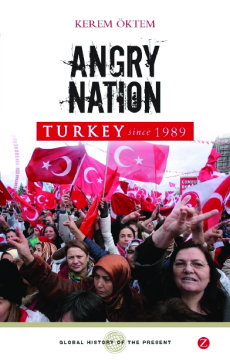
Additional Information
Book Details
Abstract
Since its re-emergence as nation-state in 1923, Turkey has often looked like an odd appendix to the West situated in the borderlands of Europe and the Middle East, economically backward, inward looking, marred by political violence, yet a staunch NATO ally, it has been eyed with suspicion by both 'East' and 'West'. The momentous changes in the regional and world order after 1989 have catapulted the country back to the world stage. Ever since, Turkey has turned into a major power broker and has developed into one the largest economies in the world. In the process, however, the country has failed to solve its ethnic, religious and historical conflicts peacefully.
At this historical turning point, Kerem Oktem charts the contemporary history of Turkey, exploring such key issues as the relationship between religion and the state, Kurdish separatism, Turkey's relationship with Israel and the ongoing controversy over Turkey's entry into the EU. Readable but comprehensive, this is the definitive book on the country's erratic transformation from a military dictatorship to a maturing, if still troubled, democracy.
Kerem Öktem is a research fellow at the European Studies Centre, St Antony's College and lectures the politics of the Middle East at the Oriental Institute.
'An admirably clear and well-researched account of the recent history of a complex, conflict-ridden and fascinating country. Essential reading.'
Margaret MacMillan, Oxford University
'Kerem Oktem has written a compelling book about an indispensable nation - and done both scholarship and modern Turkey a true service.'
David Hayes, openDemocracy
'Oktem carefully maps out all the public discourses and significant key moments in excellent prose.'
Fatma Müge Göçek, University of Michigan
'An unusually lucid and well-structured account of developments in Turkey since the end of the Cold War.'
Elisabeth Özdalga, Director of the Swedish Research Institute in Istanbul
Table of Contents
| Section Title | Page | Action | Price |
|---|---|---|---|
| Prelims | i | ||
| About the author | ii | ||
| Acknowledgements | vi | ||
| Overview of political parties in Turkey | viii | ||
| Key moments in Turkey’s history | x | ||
| Turkey before 1980 | x | ||
| Turkey since 1980 | xiii | ||
| Note on orthography and pronunciation | xix | ||
| Explanatory note | xx | ||
| Preface | xxiii | ||
| Map | xxvi | ||
| Introduction | 1 | ||
| The workings of the guardian state | 7 | ||
| Life-world transformations | 10 | ||
| 1 | Empire and nation before 1980: the late Ottoman state and the Turkish Republic | 14 | ||
| Reform and imperial dissolution | 15 | ||
| The Kemalist one-party state (1920s–1946) | 24 | ||
| The guardian state’s incomplete democracy (1946–80) | 40 | ||
| 2 | The Özal years: rupture, promise and missed chances (1980–91) | 56 | ||
| Silence and torture: 12 September 1980 | 58 | ||
| Motherland promise: wealth and stability | 66 | ||
| Re-engagement with the world: the US, Europe and 1989 | 75 | ||
| 3 | The ‘lost decade’: wars, crises and weak coalitions (1991–2002) | 84 | ||
| State of emergency in the east: the Kurdish war in the 1990s | 88 | ||
| Fighting terror: the guardian state in western Turkey | 96 | ||
| Postmodern coups and cracks in the system (1997–2001) | 105 | ||
| Crises, hopes and saviours (2000–02) | 114 | ||
| 4 | Justice and development: ‘Islamic Calvinists’ versus the guardian state (2002–07) | 122 | ||
| Islamic Calvinists in office | 126 | ||
| War and peace in Kurdistan | 140 | ||
| Memory and reality: the return of the guardians | 144 | ||
| 5 | Another nation: moving towards the present (2007–10) | 157 | ||
| The guardian state exposed | 159 | ||
| Home affairs: Kurdish, Alevi and human rights | 164 | ||
| Engaging with the world | 170 | ||
| Turkey’s possible futures | 185 | ||
| Postscript | 190 | ||
| Sources | 192 | ||
| Interview partners | 192 | ||
| Further reading on Turkey | 193 | ||
| Literature | 194 | ||
| Index | 201 |
